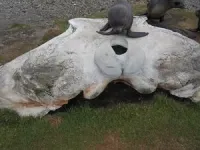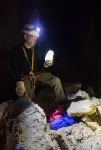(Press-News.org) Commercial whaling in the 20th century decimated populations of large whales but also appears to have had a lasting impact on the genetic diversity of today’s surviving whales, new research from Oregon State University shows.
Researchers compared DNA from a collection of whale bones found on beaches near abandoned whaling stations on South Georgia Island in the south Atlantic Ocean to DNA from whales in the present-day population and found strong evidence of loss of maternal DNA lineages among blue and humpback whales.
“A maternal lineage is often associated with an animal’s cultural memories such as feeding and breeding locations that are passed from one generation to the next,” said the study’s lead author, Angela Sremba, who conducted the research as part of her doctoral studies at Oregon State University’s Marine Mammal Institute. “If a maternal lineage is lost, that knowledge is likely also lost.”
The findings were published recently in the Journal of Heredity.
South Georgia is a remote island about 800 miles southeast of the Falkland Islands and home to several whaling stations operating from the turn of the century through the 1960s. In a little over 60 years, more than 2 million whales were killed throughout the Southern Hemisphere, of which 175,000 were killed near South Georgia.
Evidence of that slaughter is still present on the island, which is littered with thousands of whale bones – many 100 years old or more – that were discarded during commercial processing. Cold temperatures in the region aided in their preservation.
South Atlantic whale populations have begun to recover since commercial whaling was halted, but whale sightings around South Georgia remained low. This suggests that local populations may have been extirpated – a term to describe a type of localized extinction, said study co-author Scott Baker, associate director of OSU’s Marine Mammal Institute. Baker last visited South Georgia Island as part of a research voyage in early 2020.
“For 60 years, the whales have been absent from the South Georgia feeding grounds, suggesting that cultural memory was lost,” said Baker, who was Sremba’s Ph.D. advisor. “The numbers of whales returning to this region today are still not large, but there is a sense that they may be rediscovering this habitat.”
To better understand how whaling may have impacted the genetic diversity of today’s population, Sremba analyzed DNA extracted from bones found on South Georgia Island and compared the genetic information with previously published data from living whales in the contemporary post-whaling population.
She and colleagues identified bones of humpback, blue and fin whales, and found that while genetic diversity among the whales remains high, there are indications of a loss of maternal DNA lineages in the blue and humpback populations.
Researchers were not able to detect differences in diversity between pre- and post-whaling DNA samples from Southern Hemisphere fin whales, likely due to the limited availability of post-whaling samples.
Because some whale species can live up to 100 years, there is also a chance that some of today’s whales were alive during the whaling era, said Sremba, who is now a researcher with the Cooperative Institute for Marine Ecosystem and Resources Studies at OSU’s Hatfield Marine Science Center in Newport.
As these whales die, that could result in further loss of additional maternal lineages. This underscores the importance of preserving genetic information from the whales now, she said.
“It’s remarkable these species survived. In another 100 years, we don’t know what might change, and we can’t measure any change now if we don’t have a good understanding of the past,” Sremba said. “This work provides an opportunity to reconstruct the history of these whale populations and help us understand what was truly lost due to whaling activities.”
Rising temperatures due to climate change could also lead to deterioration of the DNA in the bones on South Georgia Island, Baker said.
“This work is a way to preserve this history indefinitely,” he said.
The Marine Mammal Institute is part of Oregon State’s College of Agricultural Sciences and is based at Hatfield Marine Science Center in Newport.
END
DNA from discarded whale bones suggests loss of genetic diversity due to commercial whaling
2023-10-02
ELSE PRESS RELEASES FROM THIS DATE:
Viruses dynamic and changing after dry soils are watered
2023-10-02
Viruses in soil may not be as destructive to bacteria as once thought and could instead act like lawnmowers, culling older cells and giving space for new growth, according to research out of the University of California, Davis, published Sept. 28 in the journal Nature Ecology and Evolution.
How viruses affect ecosystems, including bacteria, is challenging to untangle because they are complex and change over time and space. But the first annual rain on Mediterranean ecosystems, such as those in California, offers a kind of reset, triggering activity that can be observed.
Scientists ...
ACC Quality Summit explores practical strategies to reboot and rebrand health care quality
2023-10-02
The 2023 American College of Cardiology (ACC) Quality Summit kicks off on October 11-13 in Orlando, Florida, putting the spotlight on the value of ACC Accreditation and NCDR services to enhance health care quality. Cardiovascular clinicians and stakeholders across the U.S. will converge at this year’s Summit to discuss the role of accreditation and registries in health equity initiatives, best practices for rebooting and rebranding health care quality, and strategies to engage the CV team in the quality process.
“ACC’s ...
One in 3 adults with new-onset AFib occurring during hospitalization will have recurrent episode within a year
2023-10-02
Embargoed for release until 5:00 p.m. ET on Monday 2 October 2023
Annals of Internal Medicine Tip Sheet
@Annalsofim
Below please find summaries of new articles that will be published in the next issue of Annals of Internal Medicine. The summaries are not intended to substitute for the full articles as a source of information. This information is under strict embargo and by taking it into possession, media representatives are committing to the terms of the embargo not only on their own behalf, but also on behalf of the organization they represent.
----------------------------
1. ...
Gene expression signatures of human senescent corneal and conjunctival epithelial cells
2023-10-02
“[...] our results from the RNA-Seq experiments show that senescent ocular surface cells, particularly SCj, have abnormal keratin expression patterns [...]”
A new priority research paper was published on the cover of Aging (listed by MEDLINE/PubMed as "Aging (Albany NY)" and "Aging-US" by Web of Science) Volume 15, Issue 18, entitled, “Gene expression signatures of human senescent corneal and conjunctival epithelial cells.”
In this new study, researchers Koji Kitazawa, Akifumi Matsumoto, Kohsaku Numa, Yasufumi Tomioka, Zhixin A. Zhang, Yohei Yamashita, Chie Sotozono, Pierre-Yves Desprez, and ...
Study: Scientists investigate grand canyon's ancient past to predict future climate impacts
2023-10-02
The Grand Canyon’s valleys and millions of years of rock layers spanning Earth’s history have earned it a designation as one of the Seven Natural Wonders of the World. But, according to a new UNLV study, its marvels extend to vast cave systems that lie beneath the surface, which just might hold clues to better understand the future of climate change — by studying nature’s past.
A research team — led by UNLV paleoclimatologist and professor Matthew Lachniet — pulled an ancient stalagmite from the floor of an undisturbed Grand Canyon cave. By studying the mineral deposits’ geochemistry, they were able to analyze precipitation patterns during the rapidly ...
Study reveals high accuracy of MR-guided radiotherapy for intracranial itereotactic radiosurgery
2023-10-02
A new study, led by radiation oncology physicists at Miami Cancer Institute, part of Baptist Health South Florida, displayed positive results using intracranial stereotactic radiosurgery, also known as SRS, for an MR-guided radiotherapy system. The study, ‘Commissioning Intracranial Stereotactic Radiosurgery (SRS) for an MR-guided Radiotherapy (MRgRT) system: MR-RT Localization and Dosimetric End-to-End Validation’ published in the International Journal of Radiation Oncology - Biology - Physics (IJROBP), highlights positive accuracy through an end-to-end hidden target test to quantify the imaging, planning, and delivery coincidence ...
Trivalent vaccine candidate fights measles, mumps, SARS-CoV-2
2023-10-02
COLUMBUS, Ohio – Altered measles and mumps viruses could be used as a platform to create a trivalent COVID-19 vaccine that triggers immunity to multiple variant strains of the SARS-CoV-2 virus, new research in animals suggests.
The study builds upon previous studies that involved inserting a highly stable segment of the coronavirus spike protein into the measles vaccine or mumps vaccine.
In a paper publishing this week in Proceedings of the National Academy of Sciences, scientists at The Ohio State University report on a new MMS vaccine candidate – for Measles, ...
Simulations reveal the atomic-scale story of qubits
2023-10-02
Researchers led by Giulia Galli at University of Chicago’s Pritzker School of Molecular Engineering report a computational study that predicts the conditions to create specific spin defects in silicon carbide. Their findings, published online in Nature Communications, represent an important step towards identifying fabrication parameters for spin defects useful for quantum technologies.
Electronic spin defects in semiconductors and insulators are rich platforms for quantum information, sensing, and communication applications. Defects are impurities and/or misplaced atoms in a solid and the electrons associated with these atomic defects carry ...
Fair and sustainable futures beyond mining
2023-10-02
Mining brings huge social and environmental change to communities: landscapes, livelihoods and the social fabric evolve alongside the industry. But what happens when the mines close? What problems face communities that lose their main employer and the very core of their identity and social networks? A research fellow at the University of Göttingen provides recommendations for governments to successfully navigate mining communities through their transition toward non-mining economies. Based on past experiences with industrial transitions, she suggests that a three-step approach centred around stakeholder ...
Losing sleep? It might be time to check your blood pressure
2023-10-02
New study from Brigham researchers highlights a correlation between symptoms of insomnia and hypertension in women
Getting enough sleep has never been more difficult in today's fast-paced environment. Yet new research from investigators in the Channing Division of Network Medicine of Brigham and Women’s Hospital, a founding member of the Mass General Brigham healthcare system, highlights why getting a good night’s sleep is critical to staying healthy. Their research unveils that women who struggled with getting enough sleep were at greater risk of ...







